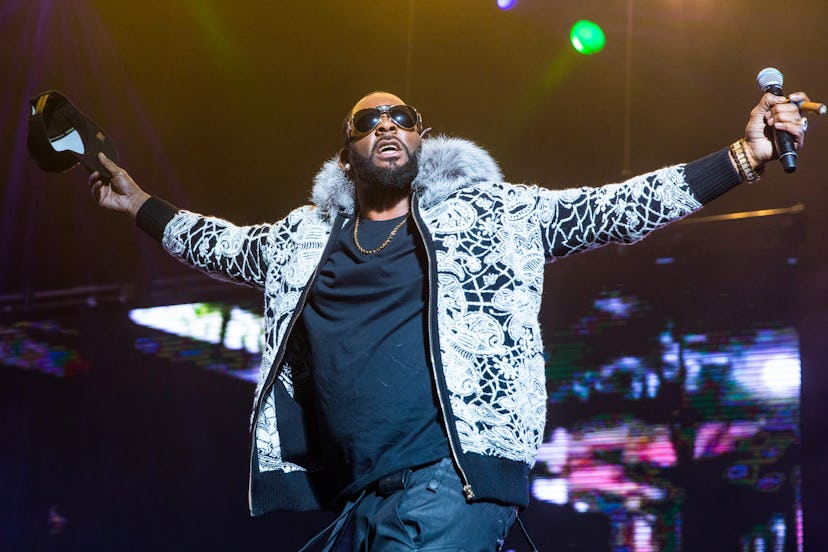After Surviving R. Kelly: A Timeline of What It Took to Finally Bring Charges of Sexual Abuse
A complete timeline of the past year, from reports of a sex “cult” to Surviving R. Kelly.

More than a decade after he was acquitted of all charges in a 2008 child pornography case, R. Kelly is once again facing a criminal indictment for sexual misconduct. On Friday, the musician was indicted on charges of 10 separate counts of aggravated criminal sexual abuse against four women, three of them underage, between 1998 and 2010, according to the Chicago Tribune. A Cook County judge also issued a warrant for his arrest Friday morning.
This could be just the start of a series of charges against Kelly across multiple cities: According to the New Yorker, a separate grand jury has been convened in New York, with an eye towards a third, and a Georgia county has reopened a previous investigation into Kelly’s alleged sex cult; the singer is also under investigation by the Department of Homeland Security for transporting young women across state lines.
As indicated by the previous 2008 trial—and the infamous sex tape that preceded it—rumors of alleged sexual abuse have followed Kelly throughout his career, but the tenor of those rumors escalated over the past year, culminating with the release of the Lifetime documentary Surviving R. Kelly, which screened in six parts in January. That’s due, in part, to a 2017 BuzzFeed News story detailing the alleged “cult” where Kelly was reported to be “keeping women against their will,” which reinvigorated the mainstream public’s interest in the case. As the reporter Jim DeRogatis, who received the sex tape anonymously by mail in 2002, while working at the Chicago Sun-Times, outlined in the BuzzFeed piece, the women whom Kelly allegedly entrapped were governed by rigid rules—how they could dress, when they could eat, who they were permitted to speak to and how. Despite the 2008 trial, which was widely reported on at the time, Kelly’s subsequent acquittal made it easier for those around him, whether fans or members of his circle, to dismiss the charges, DeRogatis wrote.
The story, which was published several months before the allegations of sexual assault against Hollywood mega-producer Harvey Weinstein ignited the #MeToo movement, went viral, but despite the groundswell of momentum outing alleged abusers seemingly every week, it took more than a year for Surviving R. Kelly to air on Lifetime. (Though the documentary’s producers began taking the idea to networks in late 2017, according to Vulture, many hesitated: “This is a subject matter dealing with a high-profile celebrity and that certainly made some people more nervous than others,” producer Tamra Simmons told Vulture.) A month before its premiere, a New York screening of the documentary—with director Dream Hampton and several of Kelly’s accusers in attendance—was shut down due to a bomb threat, activist Tarana Burke tweeted at the time. (Kelly’s ex-wife Andrea, who is interviewed in the documentary, told TMZ she suspected he was somehow involved in calling in the threat.)
“R. Kelly … has largely avoided the glare of the ‘Me Too’ spotlight,” activist Sarah Sophie Flicker opined in a column for W in November 2017, “likely because his accusers are young, women of color whose stories of abuse are rarely taken as seriously as those of white women.”
The documentary itself offers similar insight into why the allegations against Kelly have been so long, and slow, brewing. “No one cared, because we were black girls,” writer Mikki Kendall says in the series. And while its treatment of the case was somewhat sensationalized—or, really, Lifetime-ized; DeRogatis declined to participate because he was concerned about the network’s handling of the story, according to Vulture—it was also effective in mustering public outrage. Georgia, Illinois, and New York all opened or reopened investigations into Kelly’s alleged crimes, reportedly as a direct result of the documentary. In music, artists ranging from Lady Gaga to Chance the Rapper to Phoenix and Céline Dion apologized for previous collaborations with Kelly; John Legend and Sparkle, in fact, were the only musicians to go on the record for the documentary.
At the same time, online, the #MuteRKelly movement was gaining momentum. In May 2018, Spotify announced it’d be removing Kelly’s music from its playlists (despite that, there was a marked uptick in streaming of his music after the documentary aired; following the documentary, RCA Records dropped him from its roster. And now, the indictments, with reports of more investigations still to come.